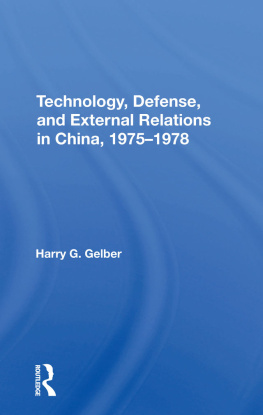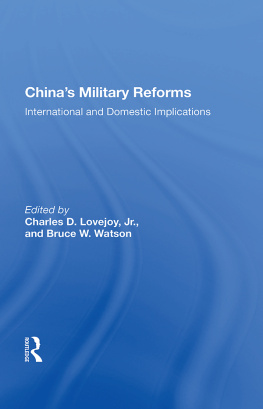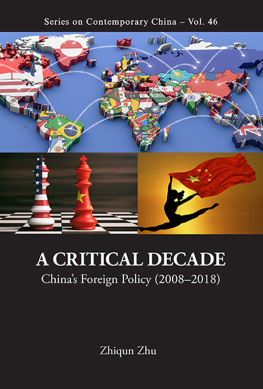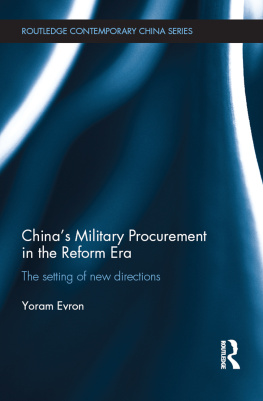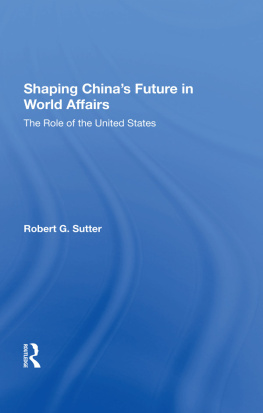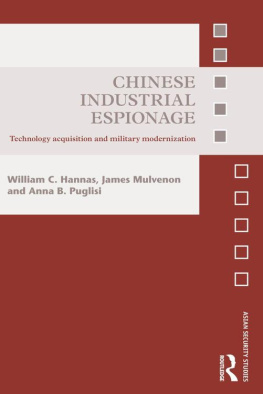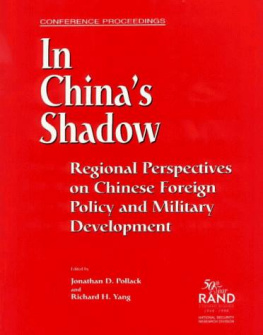Technology, Defense, and External Relations in China, 1975-1978
Other Titles in This Series
The Medieval Chinese Oligarchy, David G. Johnson
Women in Changing Japan, edited by Joyce Lebra, Joy Paulson, and Elizabeth Powers
The Chinese Military System: An Organizational Study of the People's Liberation Army, Harvey Nelsen
Cadres, Commanders, and Commissars: The Training of the Chinese Communist Leadership, 1920-45, Jane L. Price
Mineral Resources and Basic Industries in the People's Republic of China, K. P. Wang
Mineral Economics and Basic Industries in Asia, K. P. Wang and E. Chin
Huadong: The Story of a Chinese People's Commune, Gordon Bennett
China's Oil Future: A Case of Modest Expectations, Randall W. Hardy
A Theory of Japanese Democracy, Nobutaka Ike
Perspectives on a Changing China: Essays in Honor of Professor C. Martin Wilbur on the Occasion of His Retirement, edited by Joshua Fogel and William Rowe
Encounter at Shimoda: Search for a New Pacific Partnership, edited by Herbert Passin and Akira Iriye
The Problems and Prospects of American-East Asian Relations, edited by John Chay
The Politics of Medicine in China: The Policy Process, 1949-1977, David M. Lampton
Intra-Asian International Relations, edited by George T. Yu
Chinese Foreign Policy after the Cultural Revolution , 1966-1977, Robert G. Sutter
Westview Special Studies on China and East Asia
Technology, Defense, and External Relations in China, 1975-1978
Harry G. Gelber
This volume surveys efforts by China's post-Mao leadership to adopt modern technology in China's industrial and economic sectors while focusing new attention on an increasingly obsolescent defense structure. The author presents these efforts against the background of the external political and military environment to which the PRC must react. He outlines the foreign policy and strategic problems that faced the new administration as it came to power in Peking and examines the military, industrial, and technical resources currently at China's disposal as well as changes that have been proposed, implemented, or that may be required in the future. Finally, he suggests some of the limitations circumscribing government policy in these areas and some of the choices that lie ahead.
Harry G. Gelber is professor and head of the Department of Political Science at the University of Tasmania, Hobart, Australia. He has taught at Monash, Harvard, and Yale Universities and at Nuffield College, Oxford. He conducted the research for this book as a visiting fellow at the Institute of International Studies, University of South Carolina.
This volume is included as Number 12 in the Studies in International Affairs of the University of South Carolina's Institute of International Studies
Technology, Defense, and External Relations in China, 1975-1978
Harry G. Gelber
First published 1979 by Westview Press, Inc.
Published 2019 by Routledge
52 Vanderbilt Avenue, New York, NY 10017
2 Park Square, Milton Park, Abingdon, Oxon OX14 4RN
Routledge is an imprint of the Taylor & Francis Group, an informa business
Copyright 1979 Taylor & Francis
All rights reserved. No part of this book may be reprinted or reproduced or utilised in any form or by any electronic, mechanical, or other means, now known or hereafter invented, including photocopying and recording, or in any information storage or retrieval system, without permission in writing from the publishers.
Notice:
Product or corporate names may be trademarks or registered trademarks, and are used only for identification and explanation without intent to infringe.
Library of Congress Cataloging in Publication Data
Gelber, Harry Gregor.
Technology, defense, and external relations in China, 1975-1978.
(Westview special studies on China and East Asia)
1. ChinaDefenses. 2. TechnologyChina. 3. ChinaForeign relations1976-4.ChinaPolitics and government1976-I. Title.
UA835.G4 355.03'3051 79-12639
ISBN 13: 978-0-367-28976-8 (hbk)
For Susan, as Always
The period 1975-78 is one of peculiar interest for students of modern China. It saw the departure of the towering figure of Mao and the first major "changing of the guard" since 1949. In a system with few rules or institutions to guide such a succession, it created precedents. It afforded tests for competing theories about the development of the Chinese Communist Party and the balance among the competing elites in Peking. At the end of a period of anxious speculation about the likely principles and practices of post-Mao China, it provided some hard evidence of new policies. Indeed, it may have proved to be a formative period for the future policies and aspirations of China, not merely in the immediate aftermath of the changeover but for the remainder of the twentieth century and beyond. It is therefore a period that deserves particular attention.
One enters this field with some hesitation. Writing about China has been a major growth industry in recent years. Most of the literature falls into four unequal but fairly distinct categories. There are the works of China scholars proper, resting on a grasp of the language, culture, history, and politics of that great civilization. There are papers and articles written with an eye to policymaking in one capital or another. There is reportage, whether by academics, journalists, or other travelers. And there are works that attempt to bring a general grasp of economics or sociology or international relations to bear on the Chinese case. This book falls into the last category. It tries to consider the development of Chinese policies during the years 1975-78 not merely in the context of China's current history and proclaimed political and social principles, but in the light of a number of more general considerations of the balance of power, of problems of economic growth, and of the needs of technical development. In doing so, it relies on translations from Chinese originals, including official Chinese English-language documents, and on secondary sources.
Clearly, no such work could have been attempted without the help and counsel of friends and colleagues. I acknowledge with gratitude my very real debts to Michael Armacost, Doak Barnett, Robert Bowie, Richard Broinowski, Ross Cottrill, John Davies, Audrey Donnithorne, Paul Doty, Robert Furlonger, Alan Goodman, Hans Heyman, Jr., Harry Hinton, Samuel Huntington, Ellis Joffe, Chalmers Johnson, James Lilley, Robert Mathams, Makoto Momoi, Michael Nacht, Dwight Perkins, Richard Pipes, Uri Ra'anan, Pierre Ryckmans, Robert Scalapino, Thomas Schelling, and Harry Simon. My thanks not only for intellectual stimulation but for hospitality and support go to Gaston Sigur and the Institute for Sino-Soviet Studies of the George Washington University; and most particularly to Richard Walker and his colleagues at the Institute for International Studies of the University of South Carolina, where most of the study was prepared. Needless to say, any errors of omission or commission remain my own. I am further indebted to Mrs. Beth Lucas who saw to the typing of awkward drafts and, for prompt and efficient research assistance, to Mrs. Pam Clark.
But the biggest debt of any author is to his own family. To that rule I am happily no exception. Nicholas was helpful and, more important, kind. Christopher, Katharine, and Philippa were generous and forbearing when I was distracted, impatient, or downright unbearable. And without Susan the writing, proofreading, and much else besides would have been impossible, as she well knows.

